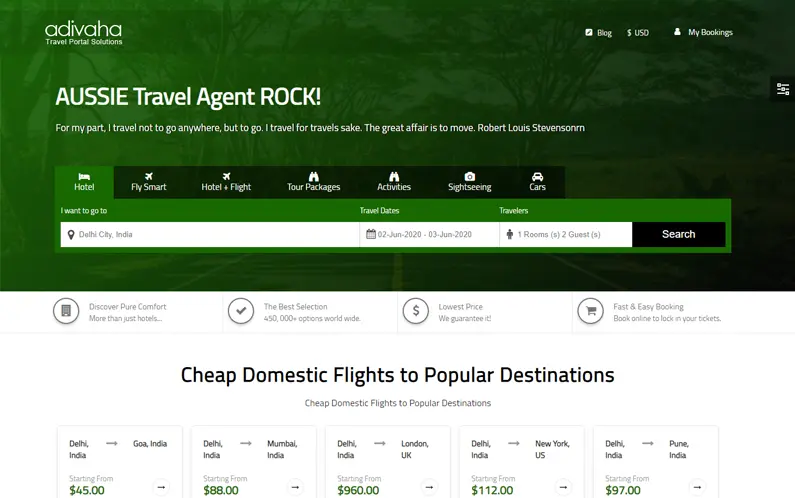Ready to go-LIVE travel solutions that helps your travel agency to sell a range of travel services pretty instantly. adivaha® travel solutions make sure you have no boundation over your imagination, you can do everything online, without the need for any technical knowledge or design skills. Easy Backoffice, extensive reporting with integrated Funds Management System.
WordPress Online Booking: The Latest Trend!
Online booking through WordPress has become an essential feature for many businesses looking to streamline their reservation processes. With the rise of e-commerce, utilizing an online booking WordPress plugin is a smart choice to efficiently manage bookings. When it comes to the hospitality industry, having an online hotel booking system WordPress plugin can significantly enhance the customer experience. It allows guests to make reservations at their convenience, without the hassle of calling or emailing back and forth. This not only improves customer satisfaction but also boosts the efficiency of hotel operations. By incorporating an online hotel booking system WordPress, hotels can easily manage room availability, rates, and promotional offers, all in one centralized platform.
When it comes to choosing the right online hotel booking system wordpress plugin, it's crucial to consider factors such as user-friendliness, customization options, and integration capabilities. A robust online booking WordPress plugin tailored for the hotel industry should offer seamless integration with popular payment gateways, ensuring secure transactions. Additionally, features like real-time room availability updates and automated confirmation emails can greatly enhance the booking experience for both customers and hotel staff. By investing in a reliable online hotel booking system WordPress, hoteliers can effectively streamline their reservation process, ultimately leading to increased revenue and customer satisfaction.
In conclusion, implementing an online hotel booking system wordpress is a strategic move for hotels looking to stay competitive in today's digital landscape. With the right online booking WordPress plugin, hoteliers can automate bookings, reduce manual errors, and provide a seamless reservation experience for guests. By leveraging the power of technology, hotels can optimize their booking process, drive more direct bookings, and ultimately foster long-lasting relationships with their customers. Embracing online booking through WordPress is not just a trend but a necessity for hotels aiming to thrive in the modern hospitality industry.
The ota wordpress theme is a versatile and feature-rich theme designed for travel affiliates looking to create a professional and engaging website. With its responsive design and customizable options, the OTA WordPress theme allows users to display travel information in a visually appealing manner. By integrating the WordPress Travel Affiliate Plugin, users can easily monetize their website by promoting travel deals and earning commissions on bookings made through their site. This powerful combination of theme and plugin makes it easy for travel affiliates to create a successful online business.
The wordpress travel affiliate plugin offers a seamless integration with the OTA WordPress theme, allowing users to showcase travel deals from various affiliate programs. This plugin provides users with access to a wide range of travel-related content, including flights, hotels, and activities. By leveraging the Plugin API WordPress, users can customize their affiliate links and track their earnings directly from the WordPress dashboard. With the ability to add custom widgets and shortcodes, users can enhance the functionality of their website and provide visitors with a user-friendly experience.
In conclusion, the OTA WordPress theme combined with the WordPress Travel Affiliate Plugin and plugin api wordpress offers travel affiliates a powerful toolset to create a successful online travel business. With its customizable options, responsive design, and seamless integration with affiliate programs, this theme and plugin duo make it easy for users to monetize their website and provide valuable travel information to visitors. Whether you're a seasoned affiliate marketer or new to the world of online travel, the OTA WordPress theme and its associated plugins offer a streamlined solution for building a profitable travel website.
The OTA WordPress theme is a versatile and user-friendly theme designed specifically for online travel agencies. With its sleek design and powerful features, this theme allows you to create a stunning online booking platform that showcases your travel packages effectively. By utilizing the WordPress travel affiliate plugin, you can easily integrate affiliate links into your website and earn commissions from travel bookings made through your site. This plugin API for WordPress provides seamless integration with various affiliate programs, making it easier for you to monetize your travel website and maximize your earnings.
When it comes to running a successful online travel booking platform, having the right tools and plugins can make all the difference. With the OTA WordPress theme, you can create a professional and visually appealing website that caters to the needs of modern travelers. By incorporating the WordPress travel affiliate plugin, you can offer a wide range of travel deals and packages from trusted affiliate partners, increasing the value proposition for your visitors. The plugin API for WordPress ensures that your website runs smoothly and efficiently, providing a hassle-free booking experience for your customers.
In today's competitive online travel market, staying ahead of the curve is essential for success. The OTA WordPress theme allows you to build a responsive and feature-rich online booking platform that caters to the needs of today's tech-savvy travelers. By leveraging the power of the WordPress travel affiliate plugin, you can expand your reach and offer a diverse range of travel options to your audience. With the plugin API for WordPress, you can easily integrate third-party services and enhance the functionality of your website, providing a seamless and user-friendly experience for your visitors.
Keep Refreshing your customers - Who doesn't want his site to stand out from crowd? adivaha® gives you multiple options for home pages, headers, colors etc. Which can easily be managed from admin via shortcodes and settings. The theme supports almost all the big players in this market ie, WEGO, Travelpayouts, Agoda, Booking, Expedia etc.












